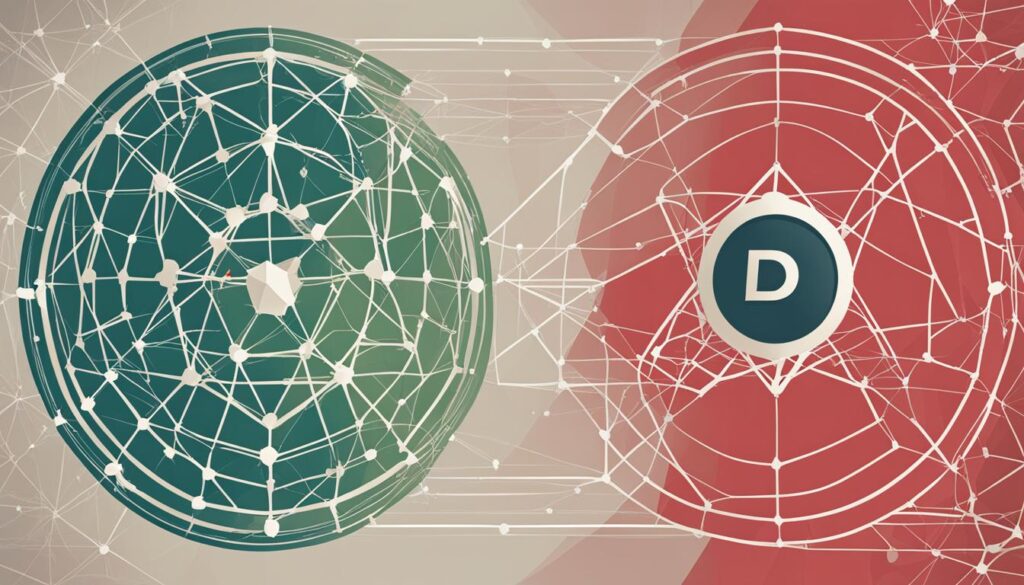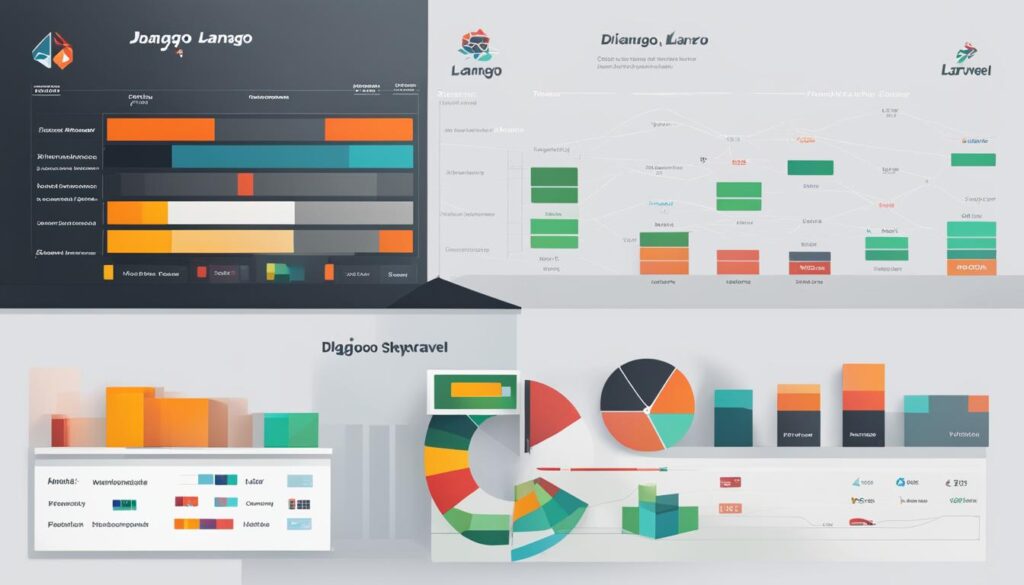Django vs Laravel: Choosing the Best Framework
Monday, 4/22/2024, 9 minutes to read

When it comes down to constructing the backbone of web applications, the dialogue inevitably turns to the Python vs PHP framework debate. In the bustling realm of web development, two towering giants stand out: Django and Laravel. Each offers distinctive features that appeal to developers worldwide, each capable of powering next-gen web services. Identifying the best web development framework typically depends on the project’s demands and the developer’s proficiency, as well as the specific benefits that a framework provides. Django, flourishing in the Python ecosystem, offers a pragmatic design loaded with all necessary tools out-of-the-box. On the flip side, Laravel operates in the PHP universe, renowned for its graceful syntax and robust features like Blade templating. As you embark on the decision-making journey, align your crosshairs on choosing the right framework tailored to your vision.
Key Takeaways
- The choice between Django and Laravel is a critical decision influenced by the specific needs of a project.
- Django is a Python-based framework, lauded for its 'batteries-included’ approach, catering to developers who seek a comprehensive toolset.
- Laravel, a PHP framework, wins admiration for its expressive and elegant syntax, especially its Blade template engine and ORM.
- Considering performance, security, scalability, and ease of learning will guide you in choosing the right framework.
- Both frameworks have strong community support, essential for both beginner and seasoned developers.
- Evaluating the merits of Django and Laravel against the backdrop of project requirements ensures a well-informed framework selection.
- The debate of Python vs PHP framework is nuanced and should account for long-term project maintenance and developer expertise.
Introduction to Web Development Frameworks
The landscape of web development has evolved rapidly, with various web development languages crafting the backbone of today’s digital platforms. Among the myriad of tools available, frameworks stand out for their capacity to streamline the creation of web applications. In this vein, two frameworks often arise as the go-to choices in efficient and robust web development—Django, with its impressive array of features, and Laravel, noted for its considerable advantages.

Django, a high-level Python framework, is revered for its simplicity and flexibility. It adheres to the „batteries-included” philosophy, offering a plethora of built-in capabilities designed to facilitate rapid development. The features of Django include an ORM (Object-Relational Mapping) for database queries, straightforward URL design, and a secure, scalable architecture that appeals to developers working on all sizes of projects.
Laravel, on the other hand, stands as a highly expressive PHP framework with a particular emphasis on a clean and elegant syntax. The advantages of Laravel include powerful tools like Eloquent ORM for database operations, Blade templating engine for crafting unique layouts with minimal effort, and a modular package system with dependency management, enhancing the efficiency and maintainability of web developments.
A comparison of these two stalwart frameworks highlights the importance of choosing one that aligns with the team’s expertise, project requirements, and long-term goals. Whether favoring Django’s robust features driven by Python’s prowess or leaning towards the elegant advantages that Laravel offers through its PHP heritage, developers have at their disposal two exceptional frameworks that promise to elevate the standard of web applications.
Core Features of Django and Laravel
When we talk about Python framework comparison, the distinction between Django and Laravel takes center stage. Both frameworks boast remarkable features that set the benchmarks in web application development. Let’s dive into the characteristics that set Django and Laravel apart in the realm of modern software engineering.
The Robust Architecture of Django
Django, a high-level Python web framework, impresses with its django features such as the Model-View-Template (MVT) architecture. This design encourages clean, pragmatic design and rapid development, essential for today’s fast-paced tech landscape. Django’s 'batteries-included’ approach equips developers with built-in solutions for common tasks, streamlining their workflow and elevating efficiency.
Django is often chosen for its security and scalability, allowing for quick adjustments to growing demand. Its comprehensive documentation and plethora of modules make it a go-to for developers looking for a complete, out-of-the-box solution.
Laravel’s Template Engine and ORM
Laravel, on the other side, shines with laravel advantages such as its elegant Blade templating engine. Blade allows developers to use plain PHP in their templates, leading to zero overhead to the application’s performance. Coupled with Laravel’s Eloquent ORM for expressive database interactions, this PHP framework facilitates an elegant syntax that reduces complexity in data handling and operations.
Moreover, Laravel’s ORM and DB migration systems provide a level of database ease and security that is attractive to both novice and experienced developers, making constructive python framework comparison discussions focus on the elegance and intuitiveness of Laravel’s database tools.
Community Support and Ecosystem
Community support and a rich ecosystem define both frameworks’ resilience and adaptability. Django boasts a vast, seasoned community ready to aid in problem-solving. Its extensive collection of packages extends its core capabilities, often streamlining the development process by providing ready-to-use components.
Similarly, Laravel’s robust ecosystem, empowered by a passionate community, offers a wide variety of packages through its Composer package management. These packages simplify implementation of complex features, which can significantly reduce development time and provide well-architected solutions.
In conclusion, the robust django features and the expressive laravel advantages contribute to a compelling python framework comparison, each serving different project needs and developer preferences.
Django vs Laravel: A Comparative Analysis
When developers and companies opt for the best web development framework, the debate often leads to Django vs Laravel. Each framework boasts unique capabilities that cater to different types of projects. This comparative analysis focuses on key aspects such as performance, security, and the learning curve associated with these frameworks.

Performance and Scalability
Performance is a key factor in choosing the right framework. Django, a Python vs PHP framework comparison winner for many, is famous for its ability to handle vast amounts of traffic with ease. Laravel, on the other hand, offers high scalability that can adapt to the growing needs of a business. But let’s delve into specifics with a closer look at their respective performances.
Security Features in Django and Laravel
Ensuring tight security is paramount in any application. Django prides itself on having a secure environment by default. It offers a robust set of features to manage authentication, sessions, and cross-site request forgeries. Laravel also offers strong security measures, but it requires developers to be more proactive in leveraging its features.
Learning Curve: Python vs PHP Framework
For newcomers looking to adopt a framework, the learning curve is an important consideration. Django’s explicit and clean design may offer a more straightforward path for those new to web development, particularly if they have a basic understanding of Python. Laravel, utilizing PHP, offers elegant syntax and a rich set of features that can be more challenging but also rewarding to master.
| Aspect | Django | Laravel |
|---|---|---|
| Language Base | Python | PHP |
| Performance | High efficiency, fast | Scalable, adaptable to traffic spikes |
| Security | Built-in features, focuses on automation | Offers manual configurations for advanced protection |
| Learning Curve | Beginner-friendly, more explicit | Steep but offers deep customization |
In conclusion, Django vs Laravel showcases the strengths and flexibility of the best web development frameworks. Despite their differences, both frameworks continue to be excellent choices for developers seeking to build secure, scalable, and high-performing web applications. Your final choice between a Python vs PHP framework will depend on your project needs, your development team’s expertise, and your long-term goals for growth and maintenance.
Conclusion
In navigating the intricate paths of web development, the decision of choosing the right framework emerges as a pivotal element influencing the success and scalability of your project. This article has endeavored to unravel the complexities and strengths of Django and Laravel, two towering figures in the realm of web development frameworks. A python framework comparison alongside a contrast against PHP-based Laravel provides developers and businesses with clarity and direction for their technical choices.
Django, with its Python roots, offers a 'batteries-included’ approach, aspiring developers to build robust applications rapidly with a well-structured and secure environment. As for Laravel, its elegant syntax and powerful features like Blade and Eloquent accentuate PHP’s potential in crafting beautifully designed applications while maintaining code simplicity. The rich discussion on django vs laravel illuminates not only their unique qualities but also the community and resources that stand behind each, further enriching the developer’s experience and problem-solving arsenal.
Ultimately, the quest for an optimal web development framework narrows down to aligning a framework’s capabilities with your project’s goals and requirements. Whether you lean towards Django’s Python-centric ecosystem or Laravel’s PHP-based artistry, your decision must resonate with the long-term vision of your enterprise. As the digital landscape continues to evolve, so too should your approach to selecting a framework that not only addresses present needs but also anticipates future expansion and complexity.
FAQ
What are the core differences between Django and Laravel?
Django is a Python-based framework with a „batteries-included” approach, offering an extensive standard library and promoting rapid development. Laravel, on the other hand, is a PHP framework known for its elegant syntax and features like the Blade templating engine and Eloquent ORM that ease web development tasks.
Which framework is considered the best for web development?
The „best” framework largely depends on the specific needs of the project, developer preferences, and the technical requirements at hand. Both Django and Laravel are highly regarded in their respective communities and have their strengths, such as Django’s scalability and Laravel’s simplicity.
What should I consider when choosing the right framework for my project?
When choosing the right framework, consider factors like the language proficiency of your team (Python vs PHP), the frameworks’ performance and scalability, security features, community support, and the learning curve for new developers.
How do Django and Laravel handle security?
Django has a strong focus on security and provides built-in protections against many common security threats, such as SQL injection and cross-site scripting (XSS). Laravel also prioritizes security, offering various mechanisms like CSRF protection and secure authentication tools.
Is Django or Laravel better for beginners?
The ease of learning can be subjective, but typically, Django is praised for its extensive documentation and straightforward approach, which may be more accessible for beginners with Python knowledge. Laravel, with its elegant syntax, may also be beginner-friendly, especially for those familiar with PHP.
In terms of performance and scalability, how do Django and Laravel compare?
Django is designed for scalability, capable of handling high-traffic sites. It encourages reusable and maintainable code, which helps in scaling applications. Laravel also provides tools to write performant code and can scale well, but complex applications might require additional optimization.
Other blog posts
Revolutionize your business with cutting-edge technology!
Let’s Bring Your Vision to Life—Contact Us Today!
📝 Get an Estimate